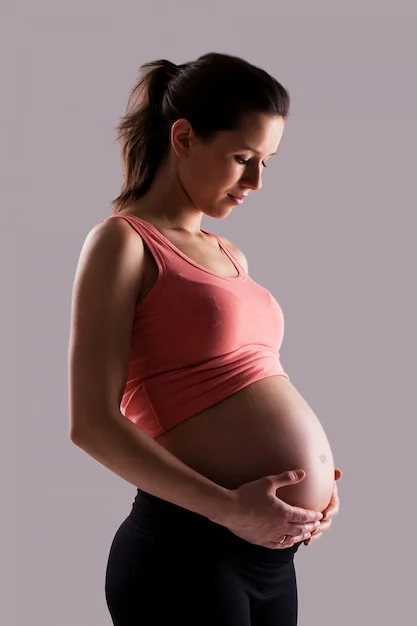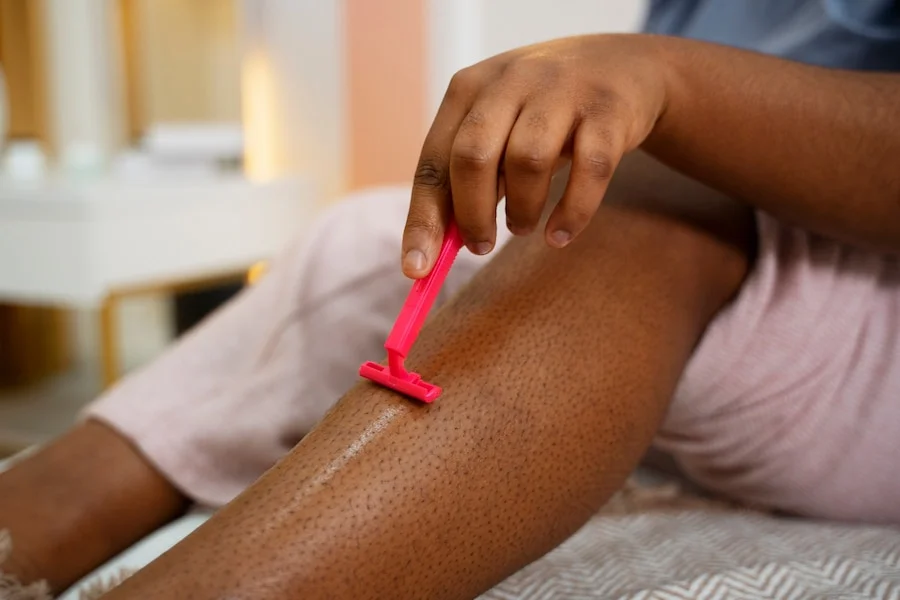From morning sickness to backaches, pregnancy comes with its fair share of challenges. But what about managing unwanted hair growth?If you’re a breastfeeding or pregnant mother considering laser hair removal, you’re not alone.In this article, we’ll dive into the topic of laser hair removal for expecting and breastfeeding moms.We’ll discuss the safety considerations, alternative hair removal methods, and everything in between.So if you’re curious about whether laser hair removal is right for you during pregnancy or while breastfeeding, keep reading to find out more. Pregnancy hormones not only influence where hair grows and how much of it you have to deal with, but they also alter the growth cycle of your hair.Both the hair on your head and your body go through the anagen phase. Once the hair has fully grown, it enters the telogen phase, after which it falls out.However, pregnancy hormones can delay the ‘falling out’ stage, which may explain why you notice thicker and fuller hair. Your body simply retains more hair than usual.Around three to six months after giving birth, when your hormones return to normal, the excess hair will start to fall out. This sudden hair loss is known as telogen effluvium.Considering the increased hair growth caused by estrogen and the challenges of reaching certain areas of your body as your belly grows, you might be wondering if laser hair removal is a viable option instead of shaving, waxing, or using depilatory creams.
Pregnancy hormones not only influence where hair grows and how much of it you have to deal with, but they also alter the growth cycle of your hair.Both the hair on your head and your body go through the anagen phase. Once the hair has fully grown, it enters the telogen phase, after which it falls out.However, pregnancy hormones can delay the ‘falling out’ stage, which may explain why you notice thicker and fuller hair. Your body simply retains more hair than usual.Around three to six months after giving birth, when your hormones return to normal, the excess hair will start to fall out. This sudden hair loss is known as telogen effluvium.Considering the increased hair growth caused by estrogen and the challenges of reaching certain areas of your body as your belly grows, you might be wondering if laser hair removal is a viable option instead of shaving, waxing, or using depilatory creams. The primary reason for this is the lack of safety studies conducted on pregnant women and their fetus.According to studies, while laser treatments haven’t been specifically studied for cosmetic use during pregnancy, they have been used safely for certain medical conditions in pregnant women.This includes treating genital warts, kidney stones, acne, and some growths.However, since there’s no research on cosmetic laser use in pregnancy, it’s best to avoid them until after childbirth.Additionally, laser hair removal can be uncomfortable, and pain management options that would ordinarily be available may not be safe for use during pregnancy.Pregnancy brings about significant hormonal shifts in your body, mainly due to increases in estrogen and progesterone levels. These changes can greatly affect how your skin reacts to laser hair removal.Firstly, your skin may become more sensitive during pregnancy. This means that you might feel more discomfort during laser treatments, and there’s a higher chance of your skin becoming irritated or red afterward.Additionally, pregnancy hormones can cause your skin to produce more melanin, the pigment that gives your skin its color. This skin condition is called Hyperpigmentation.This can result in areas of darker skin after laser hair removal, especially if you have a darker skin tone. Our blog post on laser hair removal for dark skin covers this extensively. Make sure to give it a read!
The primary reason for this is the lack of safety studies conducted on pregnant women and their fetus.According to studies, while laser treatments haven’t been specifically studied for cosmetic use during pregnancy, they have been used safely for certain medical conditions in pregnant women.This includes treating genital warts, kidney stones, acne, and some growths.However, since there’s no research on cosmetic laser use in pregnancy, it’s best to avoid them until after childbirth.Additionally, laser hair removal can be uncomfortable, and pain management options that would ordinarily be available may not be safe for use during pregnancy.Pregnancy brings about significant hormonal shifts in your body, mainly due to increases in estrogen and progesterone levels. These changes can greatly affect how your skin reacts to laser hair removal.Firstly, your skin may become more sensitive during pregnancy. This means that you might feel more discomfort during laser treatments, and there’s a higher chance of your skin becoming irritated or red afterward.Additionally, pregnancy hormones can cause your skin to produce more melanin, the pigment that gives your skin its color. This skin condition is called Hyperpigmentation.This can result in areas of darker skin after laser hair removal, especially if you have a darker skin tone. Our blog post on laser hair removal for dark skin covers this extensively. Make sure to give it a read! Hormonal changes can also affect how your hair grows. You might notice thicker or coarser hair in unexpected areas like your face, stomach, or breasts. Since laser hair removal targets the pigment in your hair, these changes can make the treatment less reliable and effective.
Hormonal changes can also affect how your hair grows. You might notice thicker or coarser hair in unexpected areas like your face, stomach, or breasts. Since laser hair removal targets the pigment in your hair, these changes can make the treatment less reliable and effective. Therefore, concerns about the lasers reaching organs or ovaries are unproven. Certain women may have concerns about lasers reaching their ovaries during bikini line treatments, but rest assured, this is an unfounded worry. Even if such a scenario were possible, which it is not, it is important to note that lasers solely target pigment and have no impact on fertility.However, it is crucial to receive laser hair removal from a qualified provider to minimize any potential risks to you and your unborn child. (Book a free laser hair removal consultation at our medical aesthetic clinic in Limoges)Dr. Lian is certified by Cynosure – manufacturer of the Elite iQ laser – to provide advanced laser treatments, and offer medical-grade laser hair removal in Limoges and other towns within the United Counties of Prescott and Russell (including Embrun, Casselman, and Russell)Related article: Can Laser Hair Removal Cause Cancer?
Therefore, concerns about the lasers reaching organs or ovaries are unproven. Certain women may have concerns about lasers reaching their ovaries during bikini line treatments, but rest assured, this is an unfounded worry. Even if such a scenario were possible, which it is not, it is important to note that lasers solely target pigment and have no impact on fertility.However, it is crucial to receive laser hair removal from a qualified provider to minimize any potential risks to you and your unborn child. (Book a free laser hair removal consultation at our medical aesthetic clinic in Limoges)Dr. Lian is certified by Cynosure – manufacturer of the Elite iQ laser – to provide advanced laser treatments, and offer medical-grade laser hair removal in Limoges and other towns within the United Counties of Prescott and Russell (including Embrun, Casselman, and Russell)Related article: Can Laser Hair Removal Cause Cancer? If you’re a lactating mother, you should know that the procedure might cause some discomfort, often needing numbing agents.However, since these agents can enter the bloodstream and possibly reach breast milk, it’s best to avoid them altogether.To reduce risks and ensure the best results, it’s advisable to wait at least 12 weeks after breastfeeding ends before restarting laser hair treatments.By then, your hormones should have balanced out.
If you’re a lactating mother, you should know that the procedure might cause some discomfort, often needing numbing agents.However, since these agents can enter the bloodstream and possibly reach breast milk, it’s best to avoid them altogether.To reduce risks and ensure the best results, it’s advisable to wait at least 12 weeks after breastfeeding ends before restarting laser hair treatments.By then, your hormones should have balanced out. After shaving, follow these additional steps for after-shave care during pregnancy:
After shaving, follow these additional steps for after-shave care during pregnancy:
Table of Contents
ToggleHow Laser Hair Removal Works
Laser hair removal is a popular cosmetic procedure that uses targeted light energy from a laser to destroy hair follicles. The energy is absorbed by the pigment (melanin) in the hair follicle, which then heats up and destroys the follicle. Over time, this results in reduced hair growth in the treated area.id=”hair_growth_phase”The hair growth cycle
Before we address the safety concerns regarding laser hair removal and pregnancy, it’s important to understand the hair growth cycle. Hair grows in three stages: anagen (growing), catagen (transitioning), and telogen (resting).Anagen
The anagen phase is known as the time of hair growth, when the hair follicle is largest, contains a lot of melanin, and is firmly attached to the root. At this stage, the hair sticks out and becomes visible above the skin. The length of this phase depends on how long the hair eventually grows, usually at least 2-3 weeks.In addition, the Anagen stage displays the hair’s darkest color, which helps in efficiently transferring heat energy from the laser to the hair follicle.Laser hair removal targets hair during the anagen stage, where it is most vulnerable to destruction.Catagen
The transition stage of hair growth is commonly referred to as Catagen. During this brief period, the hair ceases to grow and the hair follicle reduces in size. The follicle separates from the dermal papilla, which is responsible for providing it with nourishment. Subsequently, the dermal papilla undergoes regression. Typically, this phase lasts only a few days.Telogen
In the resting phase of the hair growth cycle, laser hair removal proves to be entirely ineffective since the hair is not visible and has completely detached from the root.The duration of this stage typically lasts 3 to 4 months and is followed by shedding of the hair shaft, before transitioning back to the anagen phase.How Pregnancy Affects Hair Growth
During pregnancy, hormonal changes can have various effects on your body. Increased levels of estrogen and androgen can lead to the growth of hair in new places on your body, particularly during the third trimester.You may suddenly notice hair appearing on your belly, face, neck, breasts, and arms… Don’t be worried. This is a common occurrence during pregnancy, and in most cases, the excess hair will naturally disappear after you give birth. Pregnancy hormones not only influence where hair grows and how much of it you have to deal with, but they also alter the growth cycle of your hair.Both the hair on your head and your body go through the anagen phase. Once the hair has fully grown, it enters the telogen phase, after which it falls out.However, pregnancy hormones can delay the ‘falling out’ stage, which may explain why you notice thicker and fuller hair. Your body simply retains more hair than usual.Around three to six months after giving birth, when your hormones return to normal, the excess hair will start to fall out. This sudden hair loss is known as telogen effluvium.Considering the increased hair growth caused by estrogen and the challenges of reaching certain areas of your body as your belly grows, you might be wondering if laser hair removal is a viable option instead of shaving, waxing, or using depilatory creams.
Pregnancy hormones not only influence where hair grows and how much of it you have to deal with, but they also alter the growth cycle of your hair.Both the hair on your head and your body go through the anagen phase. Once the hair has fully grown, it enters the telogen phase, after which it falls out.However, pregnancy hormones can delay the ‘falling out’ stage, which may explain why you notice thicker and fuller hair. Your body simply retains more hair than usual.Around three to six months after giving birth, when your hormones return to normal, the excess hair will start to fall out. This sudden hair loss is known as telogen effluvium.Considering the increased hair growth caused by estrogen and the challenges of reaching certain areas of your body as your belly grows, you might be wondering if laser hair removal is a viable option instead of shaving, waxing, or using depilatory creams.Is Laser Hair Removal Safe for Pregnant Women?
While there is no definitive evidence suggesting that laser hair removal is unsafe during pregnancy, the medical community generally advise against it. The primary reason for this is the lack of safety studies conducted on pregnant women and their fetus.According to studies, while laser treatments haven’t been specifically studied for cosmetic use during pregnancy, they have been used safely for certain medical conditions in pregnant women.This includes treating genital warts, kidney stones, acne, and some growths.However, since there’s no research on cosmetic laser use in pregnancy, it’s best to avoid them until after childbirth.Additionally, laser hair removal can be uncomfortable, and pain management options that would ordinarily be available may not be safe for use during pregnancy.Pregnancy brings about significant hormonal shifts in your body, mainly due to increases in estrogen and progesterone levels. These changes can greatly affect how your skin reacts to laser hair removal.Firstly, your skin may become more sensitive during pregnancy. This means that you might feel more discomfort during laser treatments, and there’s a higher chance of your skin becoming irritated or red afterward.Additionally, pregnancy hormones can cause your skin to produce more melanin, the pigment that gives your skin its color. This skin condition is called Hyperpigmentation.This can result in areas of darker skin after laser hair removal, especially if you have a darker skin tone. Our blog post on laser hair removal for dark skin covers this extensively. Make sure to give it a read!
The primary reason for this is the lack of safety studies conducted on pregnant women and their fetus.According to studies, while laser treatments haven’t been specifically studied for cosmetic use during pregnancy, they have been used safely for certain medical conditions in pregnant women.This includes treating genital warts, kidney stones, acne, and some growths.However, since there’s no research on cosmetic laser use in pregnancy, it’s best to avoid them until after childbirth.Additionally, laser hair removal can be uncomfortable, and pain management options that would ordinarily be available may not be safe for use during pregnancy.Pregnancy brings about significant hormonal shifts in your body, mainly due to increases in estrogen and progesterone levels. These changes can greatly affect how your skin reacts to laser hair removal.Firstly, your skin may become more sensitive during pregnancy. This means that you might feel more discomfort during laser treatments, and there’s a higher chance of your skin becoming irritated or red afterward.Additionally, pregnancy hormones can cause your skin to produce more melanin, the pigment that gives your skin its color. This skin condition is called Hyperpigmentation.This can result in areas of darker skin after laser hair removal, especially if you have a darker skin tone. Our blog post on laser hair removal for dark skin covers this extensively. Make sure to give it a read! Hormonal changes can also affect how your hair grows. You might notice thicker or coarser hair in unexpected areas like your face, stomach, or breasts. Since laser hair removal targets the pigment in your hair, these changes can make the treatment less reliable and effective.
Hormonal changes can also affect how your hair grows. You might notice thicker or coarser hair in unexpected areas like your face, stomach, or breasts. Since laser hair removal targets the pigment in your hair, these changes can make the treatment less reliable and effective.Considerations for Healing After Laser Hair Removal During Pregnancy
Apart from skin reactions, pregnancy can also influence how your body heals after laser hair removal.During pregnancy, your body may take longer to heal from minor injuries, including those caused by laser treatments. This means that any discomfort or irritation after the treatment might last longer than usual.Slower healing also means there’s a slightly higher risk of getting an infection at the treatment site. While infections are rare, it’s best to avoid any unnecessary risks during pregnancy.Lastly, pregnancy is already a demanding time for your body and adding a laser treatment can put extra stress on your system. It’s important to prioritize rest and avoid unnecessary procedures during this time.Can laser Hair Removal Cause Infertility in Women?
Laser hair removal poses no risk of infertility because it solely targets the surface of the skin and hair follicles, without penetrating deeper into the body. Therefore, concerns about the lasers reaching organs or ovaries are unproven. Certain women may have concerns about lasers reaching their ovaries during bikini line treatments, but rest assured, this is an unfounded worry. Even if such a scenario were possible, which it is not, it is important to note that lasers solely target pigment and have no impact on fertility.However, it is crucial to receive laser hair removal from a qualified provider to minimize any potential risks to you and your unborn child. (Book a free laser hair removal consultation at our medical aesthetic clinic in Limoges)Dr. Lian is certified by Cynosure – manufacturer of the Elite iQ laser – to provide advanced laser treatments, and offer medical-grade laser hair removal in Limoges and other towns within the United Counties of Prescott and Russell (including Embrun, Casselman, and Russell)Related article: Can Laser Hair Removal Cause Cancer?
Therefore, concerns about the lasers reaching organs or ovaries are unproven. Certain women may have concerns about lasers reaching their ovaries during bikini line treatments, but rest assured, this is an unfounded worry. Even if such a scenario were possible, which it is not, it is important to note that lasers solely target pigment and have no impact on fertility.However, it is crucial to receive laser hair removal from a qualified provider to minimize any potential risks to you and your unborn child. (Book a free laser hair removal consultation at our medical aesthetic clinic in Limoges)Dr. Lian is certified by Cynosure – manufacturer of the Elite iQ laser – to provide advanced laser treatments, and offer medical-grade laser hair removal in Limoges and other towns within the United Counties of Prescott and Russell (including Embrun, Casselman, and Russell)Related article: Can Laser Hair Removal Cause Cancer?Is It Safe to Get Laser Hair Removal While Breastfeeding?
Laser hair removal is generally safe during breastfeeding, but it’s important to be careful, especially near the areola or breast tissue. If you’re a lactating mother, you should know that the procedure might cause some discomfort, often needing numbing agents.However, since these agents can enter the bloodstream and possibly reach breast milk, it’s best to avoid them altogether.To reduce risks and ensure the best results, it’s advisable to wait at least 12 weeks after breastfeeding ends before restarting laser hair treatments.By then, your hormones should have balanced out.
If you’re a lactating mother, you should know that the procedure might cause some discomfort, often needing numbing agents.However, since these agents can enter the bloodstream and possibly reach breast milk, it’s best to avoid them altogether.To reduce risks and ensure the best results, it’s advisable to wait at least 12 weeks after breastfeeding ends before restarting laser hair treatments.By then, your hormones should have balanced out.Hair Removal Alternatives for Pregnant Women
Fortunately, there are numerous hair removal alternatives deemed safe for use during pregnancy.Waxing, plucking, and shaving all stand out as safe and effective choices for getting rid of unwanted hair.Even though these methods might demand a bit more effort compared to laser hair removal, they are generally acknowledged as a safer option during pregnancy.If you are considering shaving as the hair removal method of choice during your pregnancy, here are few essential guidelines to ensure a worry-free experience:- Use gentle shaving methods to avoid irritation, and handle the razor carefully to prevent cuts or nicks.
- Start by trimming the hair with scissors for better control. Place a mirror where you can see clearly while trimming.
- Choose a razor designed for sensitive skin and ensure it’s clean and sharp to avoid irritation.
- Use a light shaving gel or foam generously to create a protective barrier and reduce friction.
- Follow the direction of hair growth to prevent cuts, nicks, and ingrown hairs. Take your time and use gentle strokes for a safe shaving experience.
- Rinse your razor under warm water to maintain effectiveness, and reapply shaving gel if necessary for added protection.
 After shaving, follow these additional steps for after-shave care during pregnancy:
After shaving, follow these additional steps for after-shave care during pregnancy:- Rinse the shaved area with cool water to soothe the skin and reduce redness.
- Pat the area dry with a soft towel to avoid irritation.
- Use a gentle moisturizer to hydrate the skin and reduce post-shave dryness or discomfort.
- Choose loose-fitting clothing to prevent friction and allow the skin to breathe freely after shaving.
How Soon After Delivery Can You Schedule Laser Hair Removal?
It’s important to let your body rest a bit after giving birth. Also, your hormones need time to get back to normal. So, it’s a good idea to wait 4-6 months after having your baby before getting laser treatment.You can book a consultation session at Dr. Lian Beauty clinic after having your baby.During the consultation session, a patch test would be done to determine the suitability of your skin for laser hair removal treatment.Laser Hair Removal is Safe Except During Pregnancy
Overall, laser hair removal is a safe and effective cosmetic procedure for most people. While laser hair removal can be a very effective treatment to remove unwanted hairs, pregnant women should err on the side of caution and opt for non-laser hair removal methods such as waxing, plucking, or shaving. If you are interested in laser hair removal, make sure to wait until after delivery and consult with your healthcare provider.Feel free to contact our laser hair clinic in Limoges today at 613-714-9899. Alternatively, schedule a free consultation session
Dr. Lian Peter, MD, MPH, CCFP, is a Family physician with a passion for aesthetics. In her aesthetic clinic, she provides a wide range of minimally invasive and non-invasive procedures, constantly honing her skills to deliver exceptional care and help patients attain their desired appearance.





